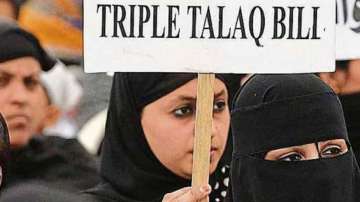Triple talaq: Muslim women coming out in large numbers to file FIRs in UP
The maximum number of 26 such cases have been registered in Meerut followed by Saharanpur and Shamli where 17 and 10 FIRs have been lodged respectively, a senior police official told PTI on Tuesday.

Uttar Pradesh is witnessing a spurt in triple talaq cases, with 216 FIRs filed by Muslim women since the enactment of a law which makes the practice of instant divorce a punishable offence.
The maximum number of 26 such cases have been registered in Meerut followed by Saharanpur and Shamli where 17 and 10 FIRs have been lodged respectively, a senior police official told PTI on Tuesday.
These three places in western Uttar Pradesh have a sizeable Muslim population.
"In UP, women given triple talaq are coming out in large numbers to register FIRs against their husbands. Within three weeks (till August 21) of implementation of the Muslim Women (Protection of Rights on Marriage) Act, 2019, as many as 216 FIRs have been filed in the state so far," he said.
In eastern Uttar Pradesh, the highest number of 10 FIRs were registered in Prime Minister Narendra Modi's constituency - Varanasi.
The main causes of triple talaq are dowry, property dispute and domestic violence as per the FIRs lodged.
However, except in two-three cases, no arrest has so far been made in the over 200 cases lodged.
In a bid to ensure effective implementation of the Act, the Uttar Pradesh Police is contemplating to arrest the accused.
"To ensure that the Act is followed in letter and spirit and justice is given to Muslim women, we are examining as to why we should not arrest those involved in giving triple talaq. We will be doing that in some districts," Director General of Police OP Singh told PTI.
He said very soon the police will also be going for "impact analysis" to ensure justice to Muslim women.
"Very soon, we will be calling a few sample cases to assess the impact to ensure justice to the victim women," he said.
Some triple talaqs have been given over phone, through SMS or directly to women.
In a case in Lucknow, a man allegedly gave triple talaq to his wife right inside civil court premises in the presence of her advocate after she refused to accept a chewing gum from him, police said.
30-year-old Simmi of Amrai village was divorced by her husband Syed Rashid where she had gone for the hearing of a case of dowry harassment she had lodged earlier against her in-laws.
The woman was talking to her advocate when her husband offered her a chewing gum which she refused, throwing Rashid into a fit of rage so much so that he divorced his wife, uttering talaq three times then and there itself.
In Banda, a woman was given triple talaq by her husband over phone, while in Barabanki a woman was given triple talaq through SMS.
In another case, a man divorced his wife allegedly to escape from the responsibility of providing treatment to their physically challenged daughter.
In a separate case, a woman alleged that her husband had ended their two-year-old marriage by pronouncing triple talaq over phone as she had a dark complexion.
In yet another case, a man allegedly divorced his wife in full public view in her village market in Unnao district using the outlawed custom and mocking at the new law that declares the oral diktat a penal offence.
The triple talaq law came into effect retrospectively from September 19, 2018, after President Ram Nath Kovind gave his assent to the legislation that makes giving instant oral triple talaq or talalq-e-biddat a criminal offence with provisions of jail term up to three years.
The new law makes void and illegal talaq-e-biddat or any other similar form of talaq having the effect of instantaneous and irrevocable divorce pronounced by a Muslim husband.
It also makes it illegal to pronounce talaq three times in spoken, written or through SMS or WhatsApp or any other electronic chat in one sitting.
The law says any Muslim husband who pronounces the illegal form of talaq upon his wife shall be punished with imprisonment for a term which may extend to three years, and shall also be liable to fine.
The aggrieved woman is entitled to demand a maintenance from her husband for herself and her dependent children under the Act.
(with inputs from PTI)